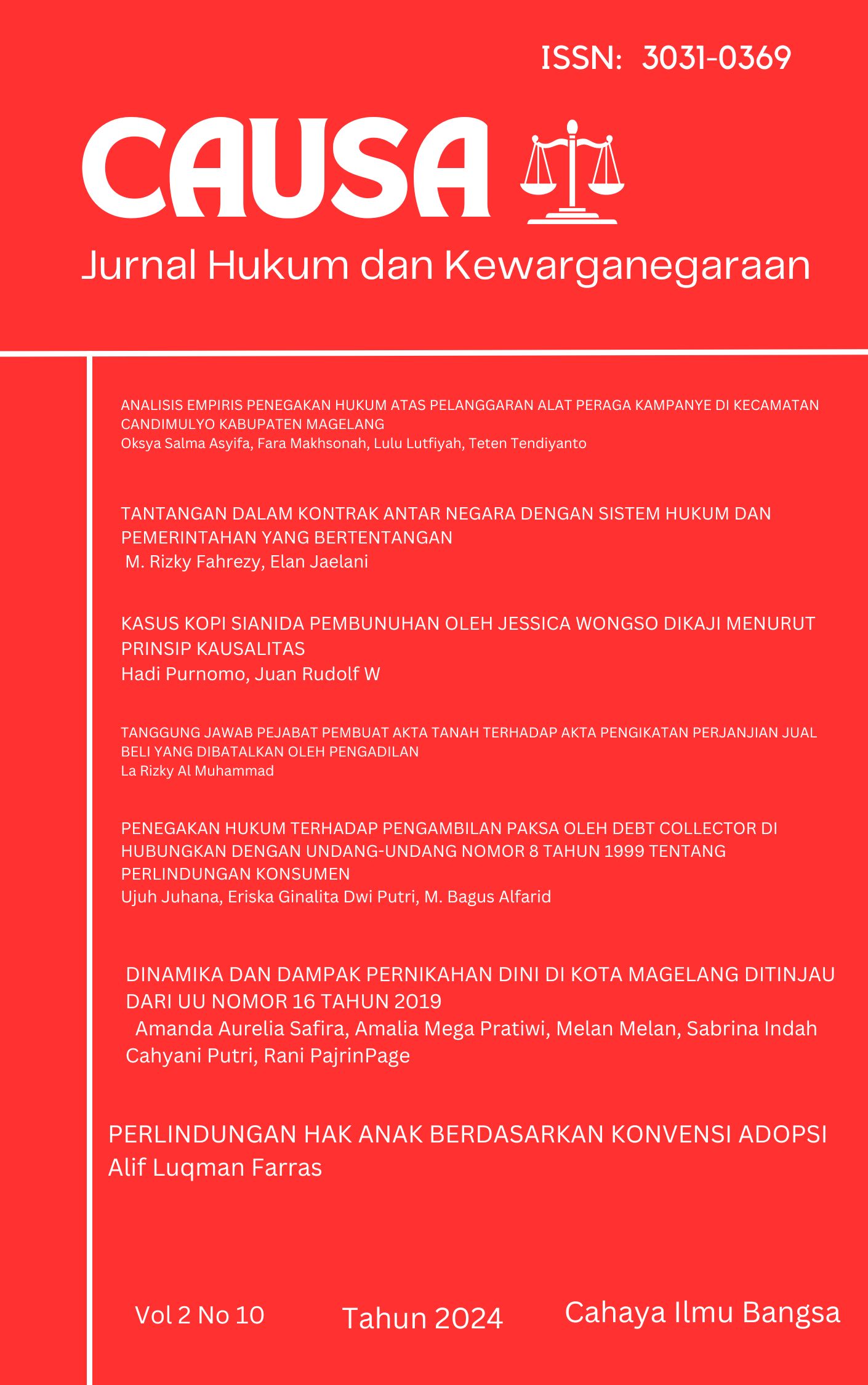PEMBAJAKAN DI PERAIRAN SOMALIA: DAMPAK GLOBAL, HUKUM INTERNASIONAL, DAN STRATEGI PENANGGULANGAN
- Authors
-
-
Irwan Triadi
Universitas Pembangunan Nasional “Veteran” JakartaAuthor -
Andi Tyara Ardiningtyas
Author
-
- Keywords:
- Piracy, International Law, UNCLOS, Maritime Security, Somalia
- Abstract
-
Piracy in Somali waters has become a serious threat to international maritime security since the early 2000s. This article reviews the background of the piracy phenomenon in Somalia, the analysis of related international law, and the efforts to overcome it that have been made by the international community. This study uses a juridical-normative approach, which is the main method in the study of legal science. This approach is based on the study of applicable positive legal norms, both in the form of international agreements, conventions, and resolutions of international organizations. In this context, relevant international law is analyzed to understand how the legal framework regulates and responds to the problem of piracy in Somali waters. With a juridical-normative approach, this study highlights the effectiveness of international maritime law in overcoming piracy, as well as the challenges faced in its implementation. Piracy in Somali waters is a multidimensional threat that not only impacts the world of shipping and the global economy, but also highlights the weaknesses of the international security system and the inability of a country to maintain the sovereignty of its maritime territory.
- Downloads
- Published
- 2025-06-16
- Section
- Articles
How to Cite
Most read articles by the same author(s)
- Kevin Angelo Pangaribuan, Alfa Immanuel Sede, Aria Saputra, Ronaldindo Rifky Trihandoko, Zaky Prasetio Emri, Irwan Triadi, PRAJURIT AKTIF DAN BISNIS: DINAMIKA HUKUM DALAM REVISI UU TNI ANTARA LARANGAN MUTLAK DAN USULAN LIBERALISASI , Causa: Jurnal Hukum dan Kewarganegaraan: Vol. 14 No. 1 (2025): Causa: Jurnal Hukum dan Kewarganegaraan
- Kevin Angelo Pangaribuan, Irwan Triadi, ANALISIS KOMPARATIF ASAS-ASAS HUKUM PIDANA UMUM DAN HUKUM PIDANA MILITER DALAM SISTEM PERADILAN INDONESIA , Causa: Jurnal Hukum dan Kewarganegaraan: Vol. 13 No. 8 (2025): Causa: Jurnal Hukum dan Kewarganegaraan
- Salsabilla Putri Kartini Farid, Irwan Triadi, ANALISIS SENGKETA PERBURUAN PAUS JEPANG-AUSTRALIA DAN IMPLIKASI HUKUM INTERNASIONAL , Causa: Jurnal Hukum dan Kewarganegaraan: Vol. 13 No. 12 (2025): Causa: Jurnal Hukum dan Kewarganegaraan
- Muhammad Arya Azra, Harul Surya Fernanda, Irwan Triadi, Iwan Erar Joesoef, PERLINDUNGAN HAK CIPTA TERHADAP PEMEGANG HAK CIPTA APLIKASI YANG DIPERJUALBELIKAN SECARA ILEGAL DI INTERNET , Causa: Jurnal Hukum dan Kewarganegaraan: Vol. 14 No. 6 (2025): Causa: Jurnal Hukum dan Kewarganegaraan
- Irwan Triadi, Salsabilla Putri Kartini Farid, Cantika Khoerunnisa Alrasyid, Andi Tyara Ardiningtyas, Disya Soraya Qhaira, MEKANISME PENYELESAIAN SENGKETA INTERNASIONAL DALAM KASUS TUMPAHAN MINYAK DI NIGERIA: PERAN DAN EFEKTIVITAS ORGANISASI INTERNASIONAL , Causa: Jurnal Hukum dan Kewarganegaraan: Vol. 13 No. 10 (2025): Causa: Jurnal Hukum dan Kewarganegaraan
- Irwan Triadi, Cantika Khoerunnisa Alrasyid, ANALISIS TERHADAP IMPLEMENTASI HUKUM INTERNASIONAL DALAM PERLINDUNGAN LINGKUNGAN GLOBAL , Causa: Jurnal Hukum dan Kewarganegaraan: Vol. 13 No. 12 (2025): Causa: Jurnal Hukum dan Kewarganegaraan
Similar Articles
- Alin Juni Aminar, Atthaya Shaka Aisha P, Samantha Amerys Marsada D, Yunia Dian Pratiwi, MENELISIK CELAH HUKUM DALAM KASUS PENIPUAN APLIKASI DANA: ANTARA TANGGUNG JAWAB KONSUMEN, PENYEDIA LAYANAN, DAN APARAT PENEGAK HUKUM , Causa: Jurnal Hukum dan Kewarganegaraan: Vol. 14 No. 4 (2025): Causa: Jurnal Hukum dan Kewarganegaraan
- Grace Avianti, PERAN MARKETPLACE DIGITAL DALAM MENINGKATKAN DAYA SAING UMKM : HARMONISASI HUKUM UNCITRAL DALAM TRANSAKSI E-COMMERCE INTERNASIONAL , Causa: Jurnal Hukum dan Kewarganegaraan: Vol. 13 No. 12 (2025): Causa: Jurnal Hukum dan Kewarganegaraan
- Kent Edward Liem, ANALISIS MULTIDIMENSIONAL TERHADAP TANTANGAN DAN STRATEGI DALAM TRANSAKSI BISNIS INTERNASIONAL : PERSPEKTIF HUKUM, EKONOMI, DAN MANAJEMEN RESIKO , Causa: Jurnal Hukum dan Kewarganegaraan: Vol. 13 No. 12 (2025): Causa: Jurnal Hukum dan Kewarganegaraan
- Daniella Sitanggang, TAHAPAN PEMBUATAN CEDAW (CONVENTION ON THE ELIMINATION OF ALL FORM OF DISCRIMINATION AGAINST WOMEN) DAN IMPLEMENTASINYA DI INDONESIA , Causa: Jurnal Hukum dan Kewarganegaraan: Vol. 14 No. 9 (2025): Causa: Jurnal Hukum dan Kewarganegaraan
- Marissa Safira Dinanti, Atika Puspita Marzaman, DINAMIKA KEAMANAN PERBATASAN DI PULAU SEBATIK DAN IMPLIKASINYA TERHADAP HUBUNGAN BILATERAL INDONESIA-MALAYSIA , Causa: Jurnal Hukum dan Kewarganegaraan: Vol. 13 No. 5 (2025): Causa: Jurnal Hukum dan Kewarganegaraan
- Rizki Arrohman, KEPAILITAN TRANSNASIONAL: STUDI KOMPARATIF INDONESIA DAN MALAYSIA DALAM ERA GLOBALISASI HUKUM , Causa: Jurnal Hukum dan Kewarganegaraan: Vol. 15 No. 1 (2025): Causa: Jurnal Hukum dan Kewarganegaraan
- Dwi May Maharani, Safina Dhifa, Maulya Khofifah, Duta Maharani, Dito Dwiyanto, Muhammad Rasit Aryansah, DINAMIKA PERDAGANGAN DUNIA DAN DAMPAK WANPRESTASI PADA KONTRAK INTERNASIONAL DI TENGAH KRISIS EKONOMI , Causa: Jurnal Hukum dan Kewarganegaraan: Vol. 12 No. 12 (2025): Causa: Jurnal Hukum dan Kewarganegaraan
- Salwa Rahmah Asysyifa Prasad, EFEKTIVITAS PENDAFTARAN JAMINAN FIDUSIA SEBAGAI PERLINDUNGAN HUKUM BAGI KREDITOR : TINJAUAN TERHADAP UU JAMINAN FIDUSIA , Causa: Jurnal Hukum dan Kewarganegaraan: Vol. 15 No. 7 (2025): Causa: Jurnal Hukum dan Kewarganegaraan
- Kamandhaka Satrio Wibowo, Muhammad Tewa Zulghafir, UPAYA DALAM PENGAWASAN PUBLIK SEBAGAI PEMICU PRAKTIK KORUPSI TERSTRUKTUR DI PT PERTAMINA (2025) , Causa: Jurnal Hukum dan Kewarganegaraan: Vol. 14 No. 9 (2025): Causa: Jurnal Hukum dan Kewarganegaraan
- Frencky Maralop, Henny Nuraeny, Sudiman Sihotang, FUNGSIONALISASI BARANG BUKTI DIGITAL YANG DIPEROLEH MELALUI DIGITAL FORENSIK DALAM PERSPEKTIF PEMBUKTIAN PERKARA PIDANA KEJAHATAN BISNIS , Causa: Jurnal Hukum dan Kewarganegaraan: Vol. 15 No. 2 (2025): Causa: Jurnal Hukum dan Kewarganegaraan
You may also start an advanced similarity search for this article.

